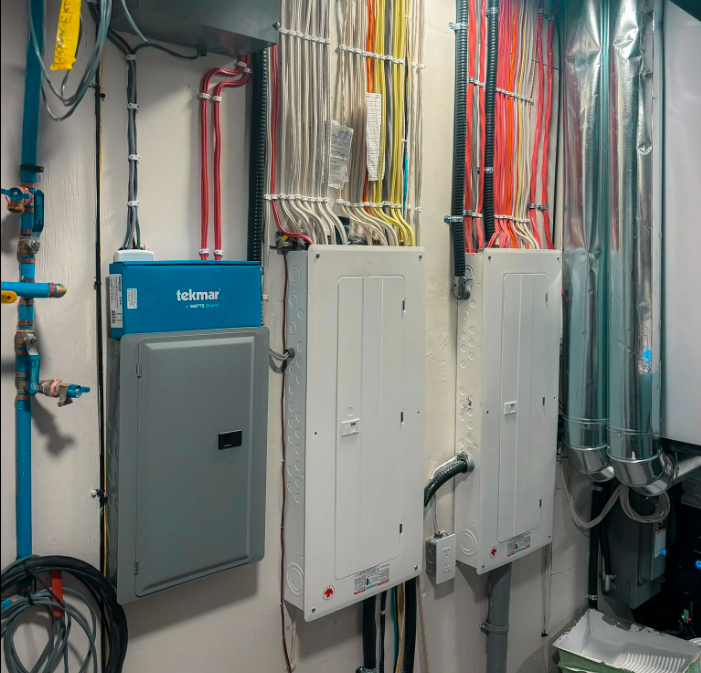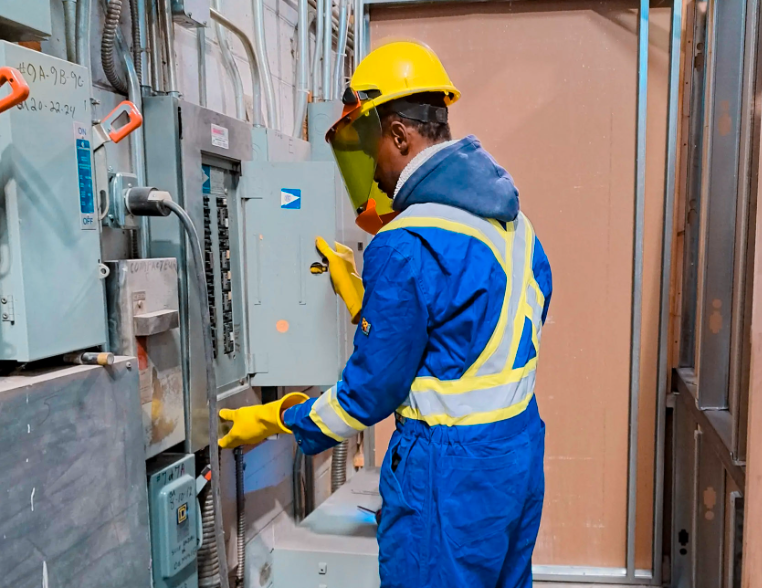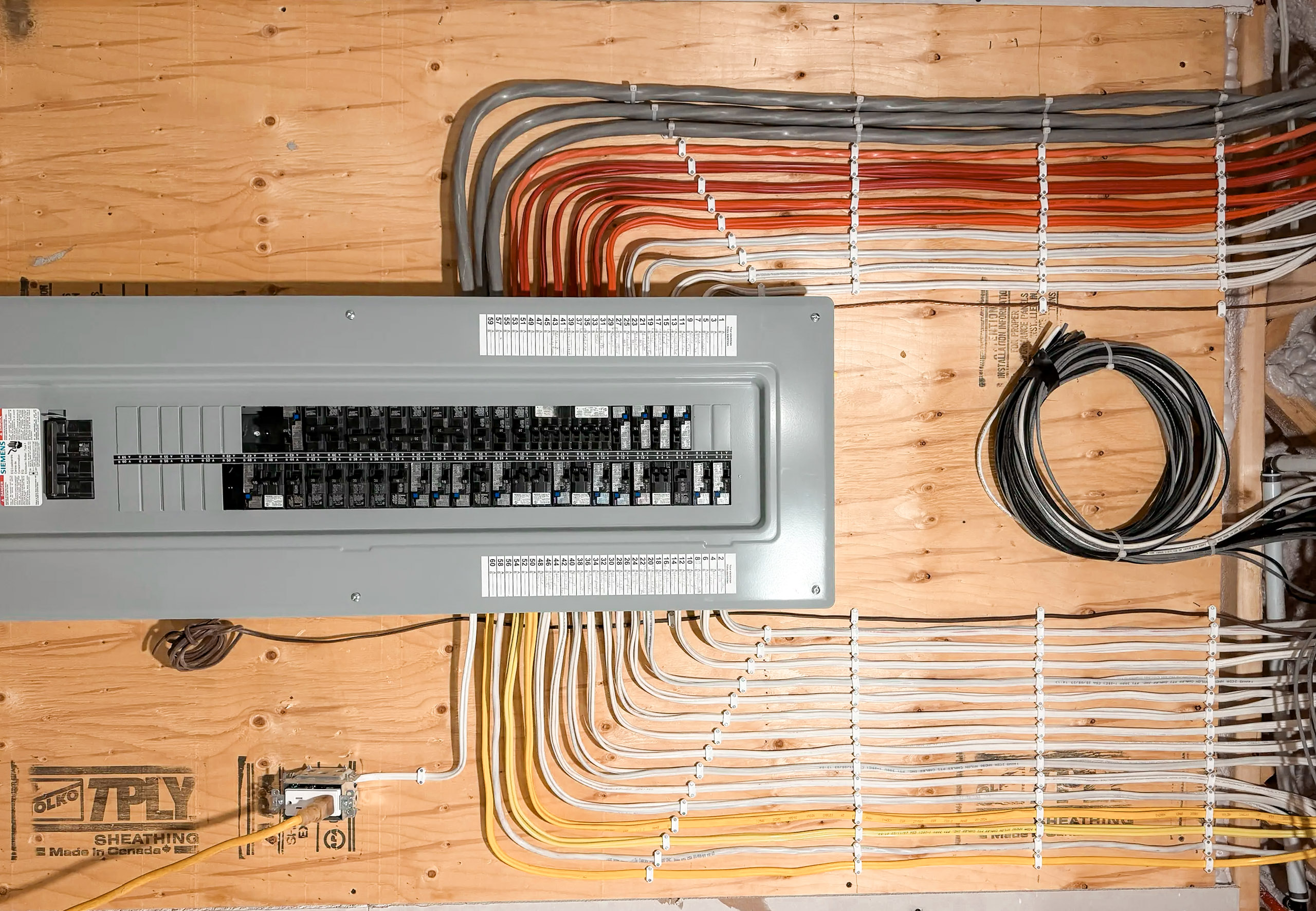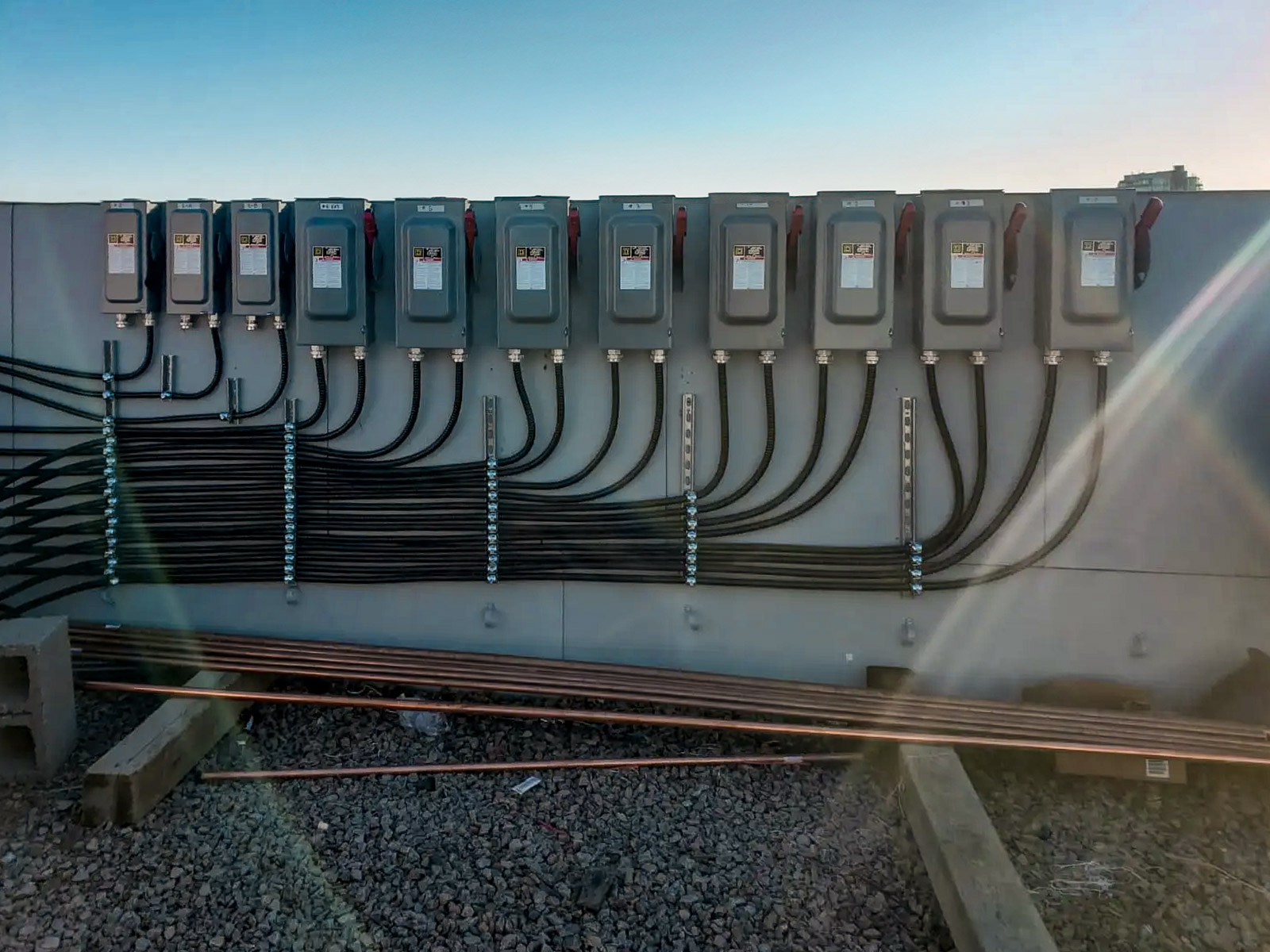Electrical Code: Is Your System Up to Standard?
By Editorial Team
Updated on December 1, 2025

It's important to know if your home's electrical installations meet current safety standards, especially if your house is older. Electrical codes are updated regularly to protect homeowners, contractors, and insurers.
This article will show you how to check if your electrical systems are up to date, explain which building codes apply, and point out upcoming changes to the electrical code.
Get Your Project Started Today
Submit your details and receive three free quotes from trusted contractors.
Our main focus is on Quebec’s Electrical Code, but the information applies across Canada since most provincial codes are based on the National Building Code. For the most up-to-date details, always check your provincial government’s website for the latest building and electrical codes.
Quebec Electrical Code: What Should Know Know?

Source: LAROCHE ET LABONTÉ ÉLECTRIQUE INC
Quebec has its own Construction Code, which includes a chapter on electricity. Chapter V corresponds to what we call the Electrical Code.
There is a National Building Code that applies across Canada. It acts as a model code in all provinces and territories, while the provincial codes include additions, specifications, and exceptions tailored to each region’s specific needs.
Some municipalities also issue their own electrical regulations. Check with your local authorities to find out if a particular code is in effect in your area.
Which Version of Quebec’s Electrical Code Is in Effect?
As of May 2025, the version of the Electrical Code published in 2018 is still in force. However, a new Quebec Construction Code is expected by 2026, and changes to the Electrical Code are planned. At the time of writing, the draft regulation introducing these changes has been published and is under review.
No publication date has been announced yet, but many sources suggest it should happen before the end of the year.
If you want to read it yourself, here is a link to download the Code Électrique Québec (Quebec Electrical Code) PDF for free. Please be aware that the content is in French.
Who Can Tell If My Electrical Installations Are Up to Code?
By reading the Electrical Code, you can perform a basic assessment of your systems (electrical panel, outlets, wiring, lighting, and appliance connections). Let’s be clear, though: only a qualified person with proper electrical training and knowledge of the latest code can properly assess the quality of your setup.
You’ll need to hire a certified electrician to inspect your electrical system components. After the evaluation, the electrician can give you their assessment and let you know if any upgrades are needed.
Home Electrical Installations—What Jobs Should Be Left to the Pros?

Source: BCD Électrique
Why Must Electrical Systems Comply With the Building Code?
Each update to the various building codes aims to improve safety for people living in houses, buildings, and public spaces. What was once considered state-of-the-art safety technology has since seen significant improvements.
Stricter standards have led to fewer electrical fires caused by faulty systems. That helps people feel safer at home and in other spaces they use daily. Refer to our article Residential Electrical Installation – When Should You Call a Pro? for complete details.
When Should You Renovate Your Electrical System?
Electrical Panel: What Are the Quebec Standards?
Your panel must be installed at a height that’s out of reach of children—between 0.9 and 1.8 metres from the floor. Here are the other requirements your panel must meet:
Wiring must follow the schematic set out in the electrical code.
It must have at least 40 circuits and 200-amp capacity.
It must be in a location that isn’t too damp.
It must include differential switches, arc-fault breakers, a main ground terminal, and a surge protector.
Still using fuses in your panel? It’s time to replace it! Insurance companies may deny coverage in case of a problem. Here’s a useful article: How to Tell When it's Time to Renovate Your Electrical Panel. Also refer to: Fuses and Circuit Breakers: What's The Difference?
What About Other Electrical Installations?
Electrical Wiring
If your home is over 30 years old and hasn’t had electrical updates, there’s a high chance the wiring needs replacement. Older wiring systems aren’t equipped to handle today’s growing electricity demands from modern appliances.
What to Do if Your Electrical Wiring Is Faulty?
Electrical Outlets
Since 2007, GFCI outlets have been mandatory in kitchens, bathrooms, and any other place exposed to water. If your outlets were installed before 2007, they likely don’t meet this key requirement.
GFCI Outlet – When and Where Should You Install It in Your Home?
What’s the Wire Colour Code in Quebec?

Source: VL electrique inc.
If colour coding is required to distinguish circuits, here’s how to identify conductor wires:
Hot Wires (carry electricity)
Black: Connects power sources to outlets and switches.
Red: Often used for 240V appliances (AC units, water heaters, dryers, stoves).
White with red or black tape: Normally neutral wires, but if taped, their role has been changed.
Blue or yellow: Sometimes found in appliances—these are hot wires.
Neutral Wires
White: Carries current back to the source to complete the circuit.
Grey: Same role as the white wire.
Ground Wires
Copper: Used when the device fails or the breaker trips.
Green / green with yellow stripe: Prevents power surges; connected to a ground terminal.
Electrical Installations in Kitchens and Bathrooms
What Are the Bathroom Outlet Rules in Quebec?
Outlets in bathrooms can be exposed to moisture and splashes. They must be suited for such environments. Any outlet within 1.5 metres of a water source must be a GFCI type. These should be installed 39 inches from the floor.
Since 2007, these outlets are mandatory in kitchens, bathrooms, and anywhere water exposure is likely.
What Does the Electrical Code Say About Kitchen Countertop Outlets?
Like in bathrooms, outlets near kitchen countertops must be GFCI type. If your kitchen counter outlets aren’t GFCI, they no longer meet current standards.
Outdoor Electrical Installation Standards
All electrical installations near water sources must be GFCI type. This includes pools and spas. For any electrical circuits above a pool or spa, the required clearance is at least 5 metres above the waterline. In some cities, overhead pool wiring is outright banned. For more info, read these articles:
Charging Station—Is Your Electrical System Powerful Enough?
More people are switching to electric cars and need home charging stations. Older electrical systems may not support the energy demands of EV charging.
If your system doesn’t meet current standards, you may need upgrades, or you could struggle to charge your vehicle.
Useful read for EV owners: Electric car charging stations: maintenance, charging & cost.
Canadian Electrical Code—What Is Its Role?

Source : Okla Electrique inc.
The Canadian Electrical Code is in its 26th edition. It’s a comprehensive document covering safety rules for installations, equipment, and electrical standards. It serves as the base for provincial codes nationwide.
For example, Quebec’s code builds on the Canadian version with local modifications to better suit provincial needs.
Each province chooses which edition of the Canadian code it uses. As of this writing, Quebec’s version is based on the 23rd edition, not the latest one.
Electrician Career—Training on the Electrical Code
To become an electrician in Quebec, you must complete a DEP (diploma), then do four 2,000-hour apprenticeship periods. After that, you can take the qualification exam. You can then take further training to deepen your expertise and stay current on tech and code updates. Organizations like the Régie du bâtiment du Québec offer these courses.
For more about this career path, read The Electrician Trade.
FAQ on Electrical Standards in Quebec
What does the code say about pool heat pumps?
Placement is critical. The unit must be in a spot with good airflow. Also, the breaker must be nearby and easy to access. The power cable must be in good shape—if not, it needs replacing. Finally, check your model’s specific power requirements to see if your system is compatible.
What are the standards for junction boxes in Quebec?
All junction boxes must be easily accessible. There must also be a vertical clearance of at least 900 mm (about 3 feet) to ensure they can be reached. The filling of junction boxes must be done carefully to avoid overcrowding. If a box is too full, it means you need to replace it with a larger one.
Fixed electrical equipment—is my snstallation up to code?
For fixed electrical equipment (heating systems, appliances requiring permanent installation), your electrical system must be capable of supplying enough power at all times. If you’re installing a new appliance, you’ll need to check whether your current system can handle the required amperage. If you have any doubts, an electrician can perform an evaluation and make the necessary upgrades. It’s a matter of safety.
Looking for something else?
Related articles
The latest industry news, interviews, technologies, and resources.

Editorial Team
•07 Dec 2023
Are you looking for a heating system that better suits your household and want to know more about forced-air heating system characteristics?

Editorial Team
•23 Jun 2025
If you have a large yard, and therefore, perform a significant amount of yard maintenance, chances are you know a thing or two about dragging electrical wires along your lawn. Now, did you know that outlets can be mounted on soil-planted posts and wires can be buried beneath your feet? You can save yourself the hassle and frustration of pulling cords across the grass by running power underground!

Editorial Team
•08 Nov 2023
The saying “everything but the kitchen sink” is one you’ve surely heard many times in your life. This speaks to the importance of the kitchen sink and since it is used multiple times on a daily basis, it’s essential to settle on a design you’ll love to look at and use constantly. We’ve prepared this guide to help you choose the sink that’s right for you!

Editorial Team
•08 Nov 2023
Nowadays, we are so used to having access to electricity at all times that when a problem occurs, we’re caught off guard. Many homeowners are reluctant to touch their electrical set-up, which is a good instinct to have, especially due to the fact that electrical work is regulated and in some places illegal to carry out without the proper certifications (Quebec included).

Editorial Team
•23 Jun 2025
If you have a large yard, and therefore, perform a significant amount of yard maintenance, chances are you know a thing or two about dragging electrical wires along your lawn. Now, did you know that outlets can be mounted on soil-planted posts and wires can be buried beneath your feet? You can save yourself the hassle and frustration of pulling cords across the grass by running power underground!